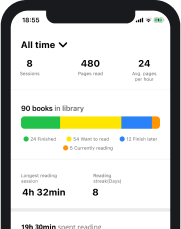As readers, we always tend to try and get the best out of each reading session. We want to always extract maximum value from the time we spend reading and more often than not, that has an influence on the way we choose the books we read. While the fiction vs nonfiction debate has been going on for ages, it’s still not clear which one is actually more beneficial.
The difference between fiction and nonfiction when it comes to the way it impacts our minds and general well-being seems to be hard to define in the sense that each genre influences us in a different way. It’s hard to say that fiction or non-fiction is better for us because they are both equally effective in improving our lives, but affect completely different aspects of our intellect and health.
To better understand the fiction and nonfiction meaning, it is important to take each genre separately and define them.
What is fiction?
Fiction is a book genre that incorporates a huge variety of subgenres that share one common characteristic: the content is entirely the result of the author’s imagination.
Fiction, whether we are talking about thrillers, science fiction, mystery books, or romance novels, is based on imaginary events that involve imaginary characters. These novels do have their roots in reality (except science fiction where the action can take place in completely alternative realities that have little or nothing in common with the world we live in).
The events described in fiction novels can happen in places that actually exist, and sometimes are quite believable, giving the reader the feeling that they could easily happen. That is one of the things about fiction that are most appealing to readers in general: the feeling that the things we read about could have actually happened, the sensation that we are reading about real events that are fascinating and intriguing.
Here are some of the most popular fiction sub-genres:
- Dystopian
- Science Fiction
- Fantasy
- Adventure
- Thriller
- Horror
- LGBTQ+
- Historical fiction
- Romance
- Detective and Mystery
- Young Adult
- Children’s Fiction
Reading fiction books comes with a series of amazing advantages. Fiction and nonfiction are both amazing in their own way, and it is up to you to decide what area of your mind or health you should be focusing on more.
What is nonfiction?
Non-fiction is a literary genre that is based on true facts. It is an informative and factually accurate piece of writing destined to present true information to the reader. Like fiction, it includes a big number of sub-genres and the informative characteristic of nonfiction books makes them the ideal learning material. There is a lot for you to learn from nonfiction books, and that is just one of the benefits of reading non-fiction.
Non-fiction books play a very important role in our society. More often than not, they have been the medium through which we learned about significant events of the past, learned about our history, and acquired important knowledge and skills. While fiction helps us explore the limits of our imagination, non-fiction is responsible for our general knowledge above everything else.
Here are the most popular non-fiction subgenres:
- Cooking
- Memoir
- Autobiography
- Biography
- Art and Photography
- Self-help
- Personal Development
- History
- Health
- Fitness and Wellness
- Crafts and Hobbies
- Business
- Politics
- Religion and spirituality
- Education
- Travel
- Motivational
- Medical
Is fiction real or fake?
While fake is a rather tough word to describe fiction, the truth is that even though the events described in fiction books are somewhat based on reality, they are still imaginary as a whole.
There is still a rather important distinction we need to make: fiction and science fiction are two different things. Science fiction is a subgenre of fiction where the action has very shallow roots in reality. While fiction in general presents events that could easily take place among us, science fiction is the result of the authors’ wildest fantasies, and the events presented are extremely unlikely to occur anytime soon.
What is the difference between fiction and nonfiction?
Now that we clearly established whether fiction is real or fake, let’s have a look at the main differences between fiction and non-fiction. Understanding how the two genres differ and why they are both important in their own way can change the way you organize your reading sessions and how you optimize your reading experience for maximum gains.
1. Fiction is based on imagination, while non-fiction is based on facts
Fiction is a lie that tells the truth.
― Neil Gaiman, Art Matters
Fiction deals with the emotional truth about the human condition, and non-fiction deals with facts and historical events. Fiction asks “What if?” while non-fiction asks “What really happened?” Fiction explores what could happen in our world, while non-fiction explores what has already happened (and usually tries to explain why). Fiction is stories and narratives that are created from the imagination. They’re often based on real events and real people but are not necessarily true in any sense beyond the story itself.
2. Fiction is subjective, while non-fiction is objective
Fiction is subjective; it tells a story that may or may not be based on real events or people. Non-fiction, on the other hand, is objective. It aims to present facts in an accurate way without drawing conclusions or making value judgments about those facts.
This means that fiction writers must be creative in order to keep their readers engaged in the story. They must create believable characters who think, feel, and act like real people would under similar circumstances. Non-fiction writers aren’t as concerned with creativity as they are with providing their readers with accurate information about a topic they’re interested in learning about.
3. Fiction is entertainment, non-fiction is knowledge
Reading fiction is a form of entertainment. We allow ourselves to enjoy the stories of the imaginary adventures the characters have, we laugh and cry, we experience a wide range of emotions, and we use our imagination to picture what the characters are going through.
Non-fiction on the other hand tells us hard facts. We use non-fiction to gain knowledge, learn about events of the past, learn new skills, or solve self-development issues we are having. That is why usually non-fiction generally requires a different reading approach and takes some getting used to. Non-fiction is a learning material more than anything else, and it can help us solve real-life problems.
What are some fiction and nonfiction examples?
With millions of books already in existence and thousands of new ones being printed each year, it would be a shame not to take advantage of the huge variety of titles out there to enjoy both fiction and nonfiction books.
To really enjoy some of the best titles in both categories, it’s a good idea to start and work your way from the top. That means looking at some of the best-selling fiction and nonfiction books of all time.
Best-selling fiction books of all time
- Don Quixote by Miguel de Cervantes – 500 million copies sold
- A Tale of Two Cities by Charles Dickens – 200 million copies sold
- The Lord of the Rings by J.R.R Tolkien – 150 million copies sold
- The Little Prince by Antoine de Saint-Exupery – 142 million copies sold
- Harry Potter and the Sorcerer’s Stone by J.K Rowling – 107 million copies sold
Most popular nonfiction books
- The Sixth Extinction by Elizabeth Kolbert
- The Year of Magical Thinking by Joan Didion
- No Logo by Naomi Klein
- Birthday Letters by Ted Hughes
- Dreams from My Father by Barack Obama
Of course, the lists above only tell part of the story. It is up to you to explore and discover what your favorite fiction and nonfiction books are, but the lists above can be a good start. Here at Basmo, we are dedicated to providing you with all the necessary tools to become the ultimate reader. That is why, among other things, we spent a considerable amount of time creating curated lists of books, to give you a chance to enjoy the very best titles, regardless of your taste and preferences.
Speaking of becoming the ultimate reader, in order to really reach your maximum potential, you definitely should get your fair share of reading from both fiction and nonfiction books. The best solution to ensure that you cover enough ground within each genre? Using a reading tracking app like Basmo. Here’s why.
Basmo allows you to set clear goals for your reading. Whether you want to set a goal for the number of minutes you spend reading every day or a big-picture goal for the number of books you go through in a year, Basmo can help you set those goals easily and effectively. In just a couple of taps, your goals are set, and the app is tracking your progress toward meeting them.
Basmo helps you be more organized. Achieving your best potential and becoming the ultimate reader can only happen if you have clear goals, a plan, and a sustainable solution for managing your reading. Again, Basmo comes with a solution.
To ensure that you take full advantage of your time, you can schedule your reading sessions. Our app comes with an easily customizable scheduler that allows you to select the days of the week when you want to read and even different times of day for each selection. That way you can take your other routines into account and create a realistic reading schedule. Moreover, the app will remind you through gentle notifications of any upcoming reading sessions.
Basmo helps you manage your reading lists. Needless to say, reading lists are important, especially if you want to make sure you read enough fiction and non-fiction as well.
Basmo comes with a couple of predefined lists that are easily updatable and editable, but also allows you to create new ones. That means you can simply create separate reading lists for fiction and non-fiction in order to make sure you enjoy the best of both worlds.
Is a novel fiction or nonfiction?
Whenever you think of reading, what you’re picturing is a novel. Even though most of them are easily believable, you should probably know that a novel is a piece of fiction. It tells a story, often about someone’s life or experiences. There are different types of novels – some are set in the past and some are set in the future. Some are based on real people or events, while others aren’t based on anything at all!
While the number of fiction subgenres is huge, the one thing all novels have in common is that they are entirely the result of their authors’ imagination.
Final thoughts
When it comes to fiction vs nonfiction, you have a lot of options. But which is right for you? And more importantly, how can you know?
Well, the truth is that different people prefer different styles of reading and there’s no set rule as to whether or not one is better than the other. One thing is certain though. To enjoy the best of both worlds, give Basmo a chance and see how much your reading habits can improve.
Image by Freepik







